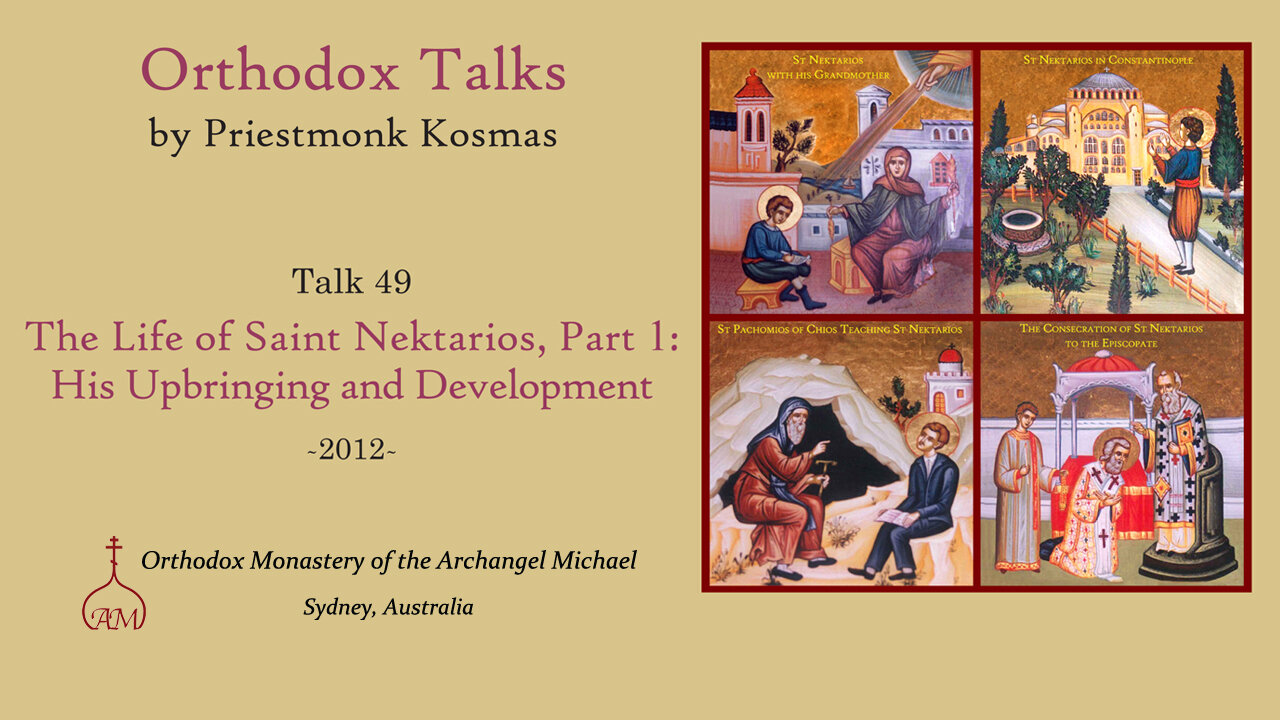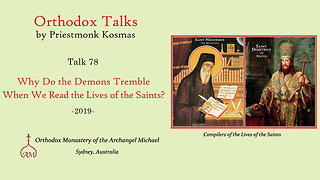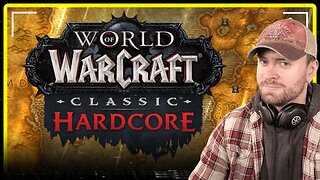Premium Only Content

Talk 49: The Life of Saint Nektarios, Part 1: His Upbringing and Development
Orthodox Talks by Priestmonk Kosmas, Sydney, Australia
iTunes: https://podcasts.apple.com/us/podcast/orthodox-talks/id1659252607
Spotify: https://open.spotify.com/show/0sKZoGUhAjJua9RtjoZS73
Podcast: https://rss.com/podcasts/orthodoxtalks/
Saint Nektarios the Wonderworker is one of the best-known saints in the Greek Orthodox Church. Anywhere in the world where there are Greeks, you can be certain of finding a church dedicated to him. Countless miracles attributed to the Saint have been reported in Greece, Australia, Canada, Europe, England, and the United States. Yet many know little or nothing about this great Saint.
In this talk, Father Kosmas emphasizes that it is important and beneficial for Orthodox Christians to read detailed lives of saints. In fact, this holy practice is absolutely essential in the struggle for the salvation of our souls – a fact that becomes obvious upon listening to this talk. In part 1 of the life of Saint Nektarios, Father Kosmas describes in detail the Saint’s upbringing and early spiritual development, his young adulthood and entry into monasticism, and his ordination to the diaconate, priesthood and episcopate.
The following questions are also discussed: what did Saint Nektarios consider the main purpose of education? Is it true that Orthodox saints oppose the theology and spirituality of the West? Which is worse, bodily cancer or spiritual cancer? Is it really important to reprimand and warn our children? How did Saint Kosmas of Aetolia influence Saint Nektarios? Do the saints experience any pain or despair during their persecutions?
Other points covered in this talk include: the false idea that the saints never experienced physical or spiritual crises; Saint Nektarios’ fear of falling into pride; how life’s difficulties can teach one true prayer; how children bond more with the TV than with people; how Orthodox ecumenists use deceit for their unorthodox agenda; the difficulties of living under Turkish rule; and the importance of not pushing children to follow a fixed path.
-
 4:00:03
4:00:03
Orthodox Talks
2 years agoTalk 78: Why Do the Demons Tremble When We Read the Lives of the Saints?
2.11K1 -
 LIVE
LIVE
MattMorseTV
2 hours ago $0.60 earned🔴Gaming Sunday🔴
3,008 watching -
 24:24
24:24
Jasmin Laine
3 hours ago“Their BIGGEST Mistake Yet”—U.S. Officials TORCH Carney in Brutal Report
3.88K9 -
 27:01
27:01
TheRoyaltyAutoService
7 hours agoAnother Shop Replaced The Timing Belt & Fuel Injectors On This Honda Pilot… Now It Has No Power!
391 -
 LIVE
LIVE
GritsGG
9 hours agoRanked Crim 2! Most Wins 3390+ 🧠
273 watching -
 LIVE
LIVE
IsaiahLCarter
22 hours agoJonah O. Wheeler: In Defense of Reality || APOSTATE RADIO #026
263 watching -
 LIVE
LIVE
Cewpins
3 hours agoSmoke Sesh🔥Gaming???💨420🍃!MJ !giveaway
43 watching -
 LIVE
LIVE
Phyxicx
1 hour agoShin Megami Tensei - Part 5 - 8/13/2025 | Chaos Route | Expert Difficulty
56 watching -
 1:59:32
1:59:32
vivafrei
11 hours agoEp. 277: Russia Peace Talks! Trump D.C. Takeover Leads to Lawsuit! Heat Wave Lawsuit? AND MORE!
61.6K29 -
 LIVE
LIVE
Nerdrotic
3 hours ago $1.58 earnedTransient Lunar Phenomenon: Deeper into the Mysteries of the Moon | Forbidden Frontier #112
565 watching